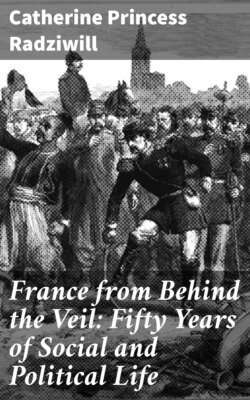Читать книгу France from Behind the Veil: Fifty Years of Social and Political Life - Catherine Princess Radziwill - Страница 4
На сайте Литреса книга снята с продажи.
ОглавлениеEMPRESS EUGÉNIE
most attractive that has ever lived—but she certainly was not an ideal Sovereign.
When Eugénie married she was already twenty-seven, and therefore it was not easy for her to become used to the various duties and obligations of her new position. She was a thorough woman of the world, which rendered her especially charming when at Compiègne or at Fontainebleau, where etiquette was not so strict as at the Tuileries. At those moments she was positively bewitching, but when she thought it necessary to assume her Imperial manner she lost her womanly charm.
There have been many beautiful moments in Eugénie’s life; such, for instance, as her famous visit to Amiens at the time the cholera was raging there, and when, with a truly royal indifference, she exposed herself to very real and serious danger. She was charitable, and preferred not to boast of her charities; but, not possessing the Emperor’s disposition, she resented injuries done to her. She was impetuous in all that she did, thought, or felt; certainly bigoted and superstitious, as Spaniards generally are. She was not courageous, though brave, because these are two very different things. She would not have minded being murdered in state, and the memory of the deed being handed down to posterity; but she could not find the resolution to face an intricate situation, nor to remain silent and firm at a difficult moment. Her nature was essentially restless; she could never wait with patience for what the future might hold. Her attitude on the 4th of September was characteristic, and it was in accordance with her nature that she tried to explain the abandonment of her position as Regent by the word “necessity,” when, in reality, it was the shrinking of a lonely woman, with no one near her to tell her what she ought to do, or to show her how to resist the demands of the mob.
But once more I must say she exercised a wonderful fascination on all those whom she entertained. There was something remarkable in the influence she exercised. In her presence one forgot all save her extraordinary charm.
In her private life Eugénie de Montijo, in spite of all that has been said and written on that subject, has always been irreproachable. Amid all the gaieties of the Court over which she presided she remained pure and chaste, and redeemed the many frailties of her outward demeanour by the dignity and blamelessness of her existence as a wife and mother. She bitterly resented the indiscretions of the Emperor, but she kept herself aloof from everything that could have been construed as a desire on her part to retaliate. Perhaps her temperament helped her; but it is certain that as a wife she was blameless, and that she showed herself an enlightened mother, trying to bring up her son above the flatteries that usually surround children born in such a high position, teaching him to obey, to be grateful to those who took care of him, and loving him quite as well and more wisely than the Emperor, who was perhaps too indulgent in matters which concerned his only son. That the Prince Imperial remained an only child was a source of deep grief to Napoleon III.
When first I saw Eugénie, her whole appearance was fairy-like; in spite of her forty years, she eclipsed all other women. Her slight, graceful figure was almost girlish in its suppleness, and she is the only woman I have ever seen who, though in middle life, did not prompt one to utter the usual remark when lovely members of the fair sex have attained her age: “How beautiful she must have been when she was young!”
